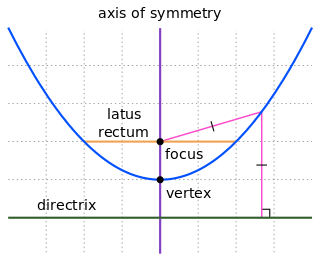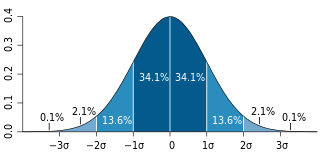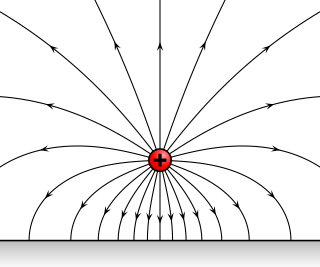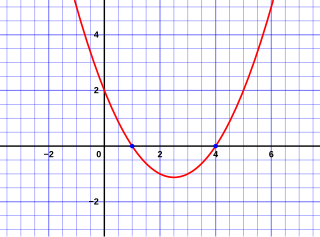Generally speaking, a calendar year begins on the New Year's Day of the given calendar system and ends on the day before the following New Year's Day, and thus consists of a whole number of days. A year can also be measured by starting on any other named day of the calendar, and ending on the day before this named day in the following year. This may be termed a "year's time", but not a "calendar year". To reconcile the calendar year with the astronomical cycle certain years contain extra days.

In mathematics, a parabola is a plane curve that is mirror-symmetrical and is approximately U-shaped. It fits several superficially different other mathematical descriptions, which can all be proved to define exactly the same curves.

In Euclidean plane geometry, a quadrilateral is a polygon with four edges and four vertices or corners. Sometimes, the term quadrangle is used, by analogy with triangle, and sometimes tetragon for consistency with pentagon (5-sided), hexagon (6-sided) and so on.

In statistics, the standard deviation is a measure that is used to quantify the amount of variation or dispersion of a set of data values. A low standard deviation indicates that the data points tend to be close to the mean of the set, while a high standard deviation indicates that the data points are spread out over a wider range of values.

An electric field is a vector field surrounding an electric charge that exerts force on other charges, attracting or repelling them. Mathematically the electric field is a vector field that associates to each point in space the force, called the Coulomb force, that would be experienced per unit of charge by an infinitesimal test charge at that point. The units of the electric field in the SI system are newtons per coulomb (N/C), or volts per meter (V/m). Electric fields are created by electric charges, or by time-varying magnetic fields. Electric fields are important in many areas of physics, and are exploited practically in electrical technology. On an atomic scale, the electric field is responsible for the attractive force between the atomic nucleus and electrons that holds atoms together, and the forces between atoms that cause chemical bonding. Electric fields and magnetic fields are both manifestations of the electromagnetic force, one of the four fundamental forces of nature.

In mathematics, the quaternions are a number system that extends the complex numbers. They were first described by Irish mathematician William Rowan Hamilton in 1843 and applied to mechanics in three-dimensional space. A feature of quaternions is that multiplication of two quaternions is noncommutative. Hamilton defined a quaternion as the quotient of two directed lines in a three-dimensional space or equivalently as the quotient of two vectors.

In elementary algebra, the quadratic formula is the solution of the quadratic equation. There are other ways to solve the quadratic equation instead of using the quadratic formula, such as factoring, completing the square, or graphing. Using the quadratic formula is often the most convenient way.

The ideal gas law, also called the general gas equation, is the equation of state of a hypothetical ideal gas. It is a good approximation of the behavior of many gases under many conditions, although it has several limitations. It was first stated by Émile Clapeyron in 1834 as a combination of the empirical Boyle's law, Charles's law, Avogadro's law, and Gay-Lussac's law. The ideal gas law is often written as
Deductive reasoning, also deductive logic, logical deduction is the process of reasoning from one or more statements (premises) to reach a logically certain conclusion.
![Dead Sea Scrolls Ancient Jewish religious, mostly Hebrew, manuscripts found in the Qumran Caves in the West Bank] near the Dead Sea](https://upload.wikimedia.org/wikipedia/commons/thumb/d/d4/Flag_of_Israel.svg/320px-Flag_of_Israel.svg.png)
The Dead Sea Scrolls are ancient Jewish religious, mostly Hebrew, manuscripts found in the Qumran Caves in the West Bank near the Dead Sea. Scholarly consensus dates these scrolls from the last three centuries BCE and the first century CE. The texts have great historical, religious, and linguistic significance because they include the second-oldest known surviving manuscripts of works later included in the Hebrew Bible canon, along with deuterocanonical and extra-biblical manuscripts which preserve evidence of the diversity of religious thought in late Second Temple Judaism. Almost all of the Dead Sea Scrolls collection is currently under the ownership of the Government of the state of Israel, and housed in the Shrine of the Book on the grounds of the Israel Museum.

Coenzyme Q10, also known as ubiquinone, ubidecarenone, coenzyme Q, and abbreviated at times to CoQ10, CoQ, or Q10 is a coenzyme that is ubiquitous in animals and most bacteria (hence the name ubiquinone). It is a 1,4-benzoquinone, where Q refers to the quinone chemical group and 10 refers to the number of isoprenyl chemical subunits in its tail.

Capacitance is the ratio of the change in an electric charge in a system to the corresponding change in its electric potential. There are two closely related notions of capacitance: self capacitance and mutual capacitance. Any object that can be electrically charged exhibits self capacitance. A material with a large self capacitance holds more electric charge at a given voltage than one with low capacitance. The notion of mutual capacitance is particularly important for understanding the operations of the capacitor, one of the three elementary linear electronic components.

In geometry, an equilateral triangle is a triangle in which all three sides are equal. In the familiar Euclidean geometry, an equilateral triangle is also equiangular; that is, all three internal angles are also congruent to each other and are each 60°. It is also a regular polygon, so it is also referred to as a regular triangle.
In algebra, the partial fraction decomposition or partial fraction expansion of a rational function is an operation that consists of expressing the fraction as a sum of a polynomial and one or several fractions with a simpler denominator.

In geometry, the Schläfli symbol is a notation of the form {p,q,r,...} that defines regular polytopes and tessellations.

The DHC-8 Dash 8 is a series of turboprop-powered regional airliners, introduced by de Havilland Canada (DHC) in 1984. DHC was later bought by Boeing in 1988, then by Bombardier in 1992; the program is to be resold to Viking Air parent Longview Aviation Capital by late 2019. Powered by two Pratt & Whitney Canada PW100s, it was developed from the Dash 7 with improved cruise performance, lowered operational costs but worse STOL performance. Three sizes were offered: initially the 37-40 seat -100 until 2005 and the more powerful -200 from 1995, the stretched 50-56 seats -300 from 1989, both until 2009, and the 68-90 seats -400 from 1999, still in production. The Q Series are post-1997 variants with quieter cabins.

Electric potential energy, or electrostatic potential energy, is a potential energy that results from conservative Coulomb forces and is associated with the configuration of a particular set of point charges within a defined system. An object may have electric potential energy by virtue of two key elements: its own electric charge and its relative position to other electrically charged objects.
ICD-10 is an international statistical classification used in health care and related industries.

Coulomb's law, or Coulomb's inverse-square law, is a law of physics for quantifying Coulomb's force, or electrostatic force. Electrostatic force is the amount of force with which stationary, electrically charged particles either repel, or attract each other. This force and the law for quantifying it, represent one of the most basic forms of force used in the physical sciences, and were an essential basis to the study and development of the theory and field of classical electromagnetism. The law was first published in 1785 by French physicist Charles-Augustin de Coulomb.









![Dead Sea Scrolls Ancient Jewish religious, mostly Hebrew, manuscripts found in the Qumran Caves in the West Bank] near the Dead Sea](https://upload.wikimedia.org/wikipedia/commons/thumb/d/d4/Flag_of_Israel.svg/320px-Flag_of_Israel.svg.png)




